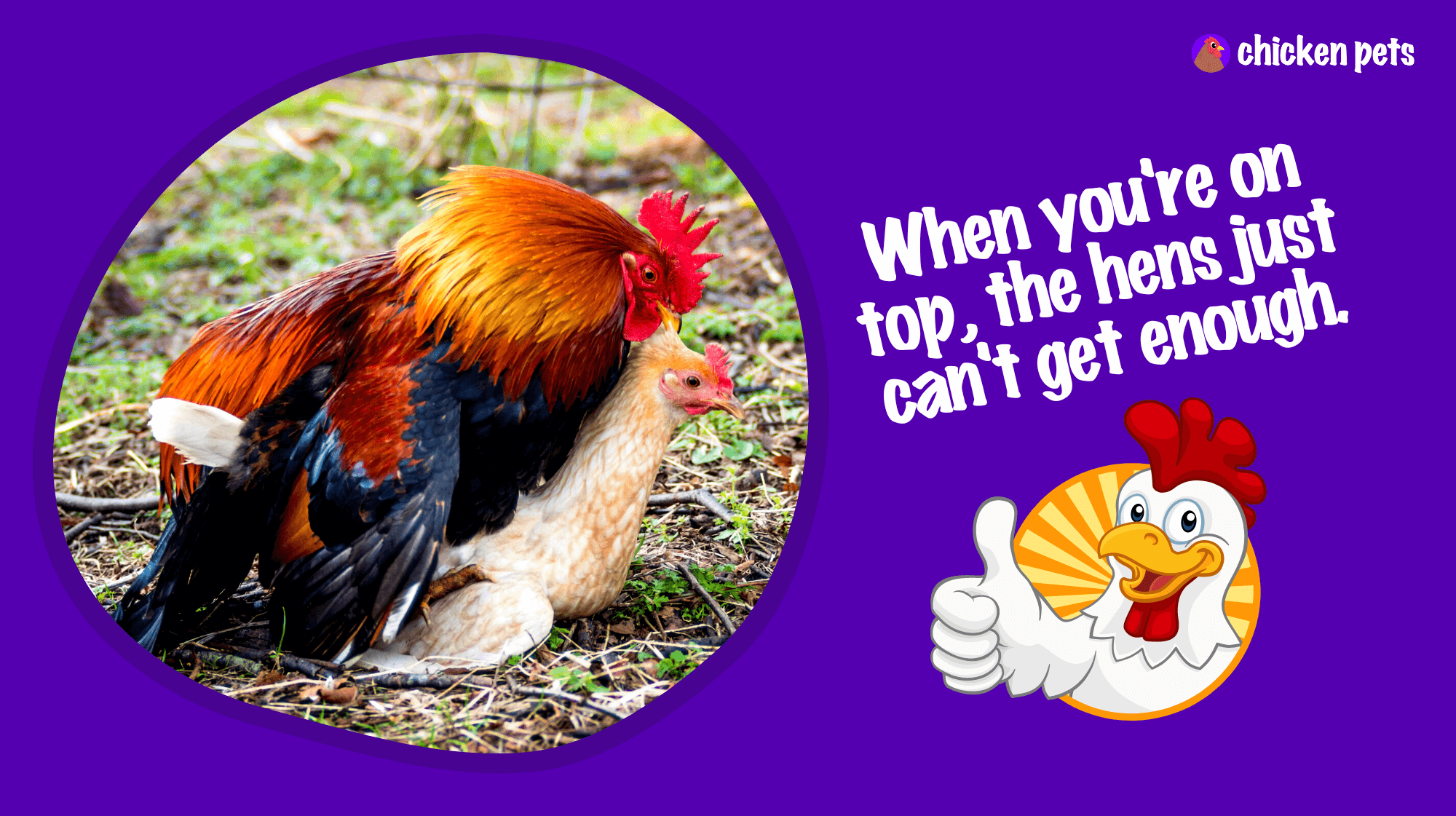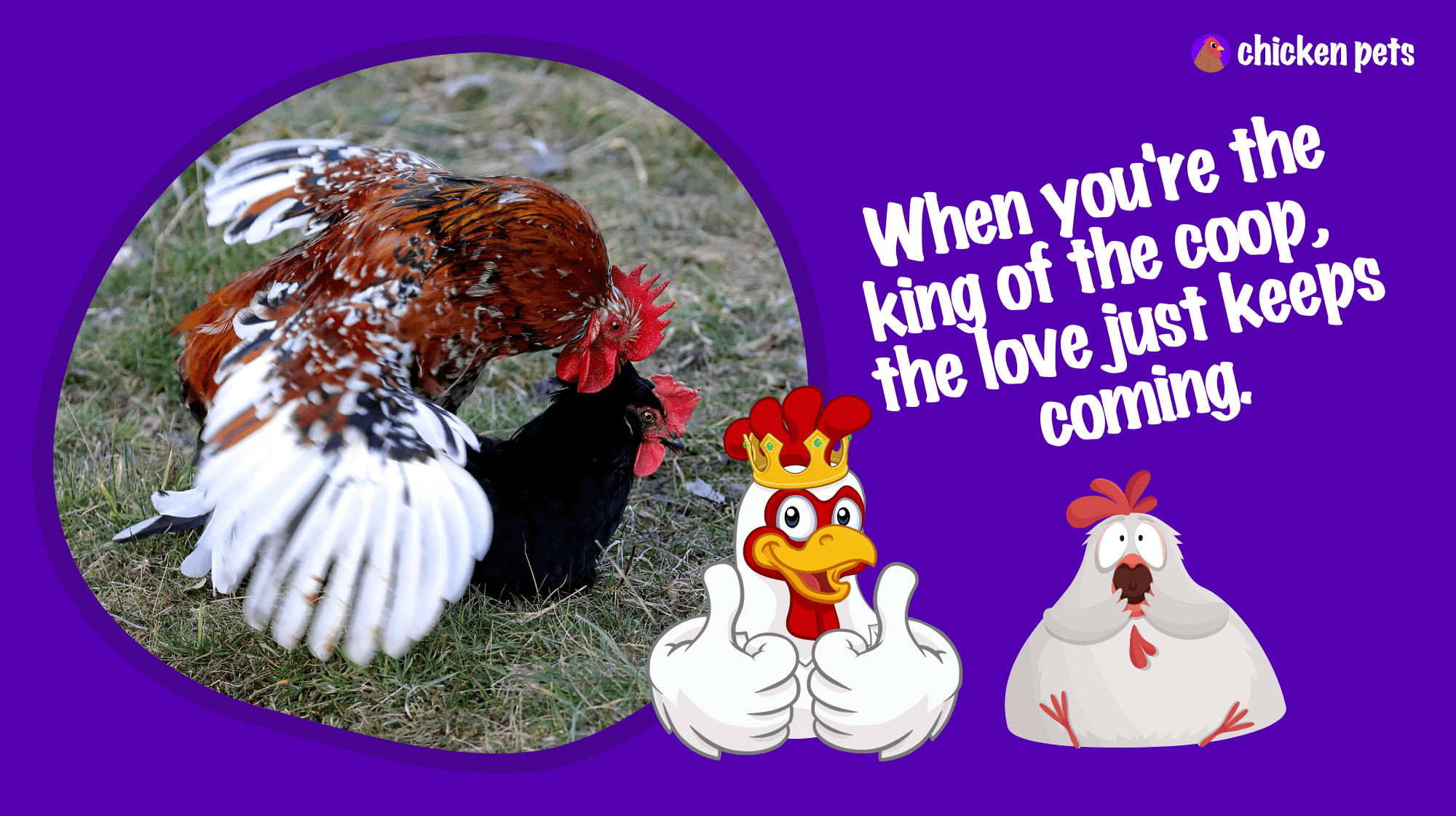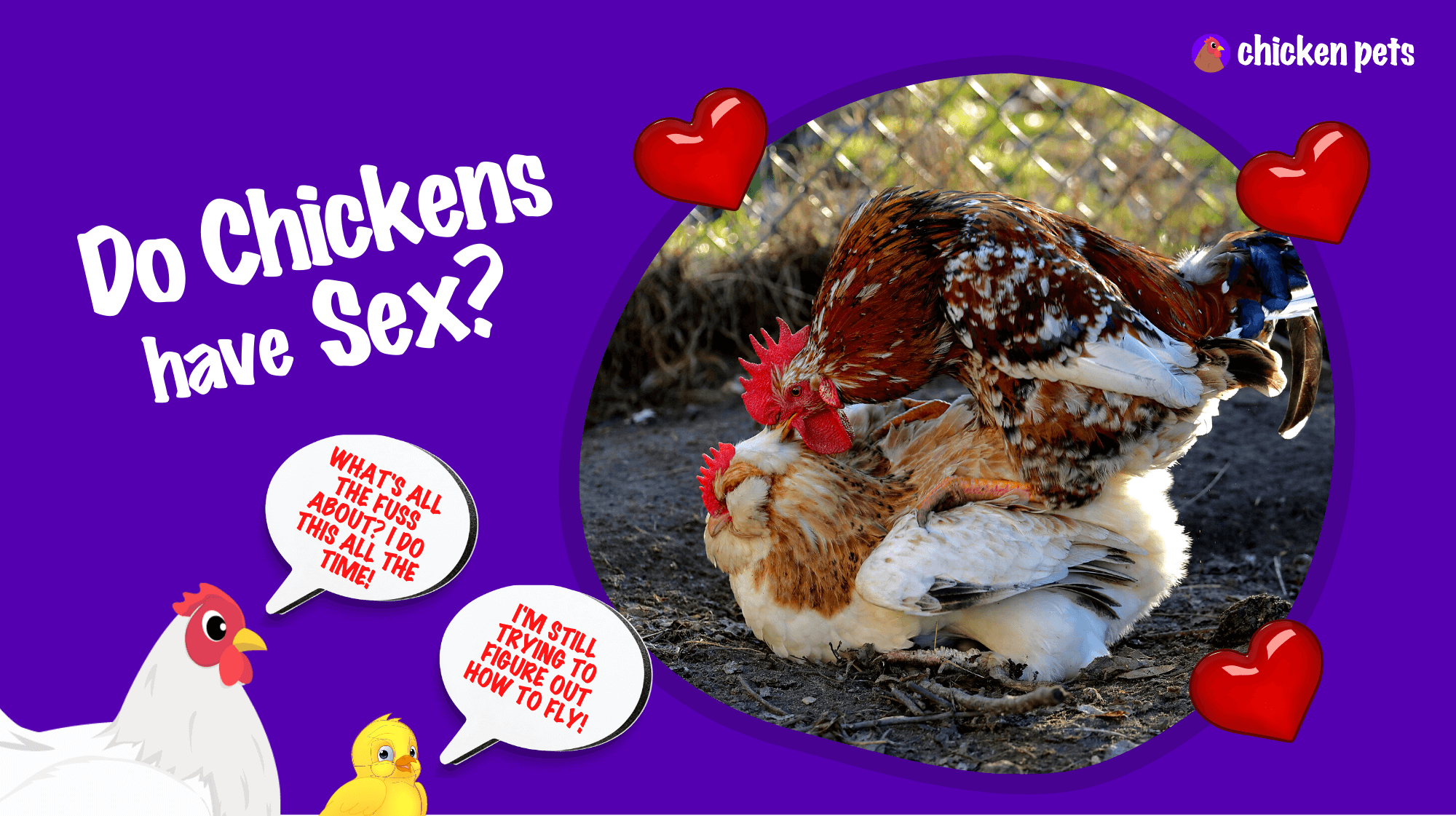Fowl play! We’re going to get down and dirty with the birds and the bees… chicken style. That’s right, we’re talking about the ins and outs (literally) of chicken mating. Whether you’re a seasoned poultry farmer or just curious about the avian love lives, buckle up for a wild ride because we’re answering the question on everyone’s minds: do chickens have sex?
Do chickens have sex?
Yes, chickens do have sex. Chickens are animals; like most animals, they mate to reproduce. During mating, the male chicken—rooster—will mount the female chicken—hen—and copulate with her.
Do female chickens have sex, poop, pee, and lay eggs from the same hole?
Female chickens will poop, pee, have sex, and lay eggs from the same opening called the cloaca! It is a single opening between the legs and is used for mating, egg-laying, urinating, and taking dumps. Yummy.
Do hens have vaginas?
Yes, hens have a reproductive organ that is similar to a vagina. This organ is called a cloaca, located near the tail end of the hen. The cloaca is a multi-purpose organ that serves as the reproductive organ for laying eggs and the waste disposal system for the chicken’s digestive system.
Do roosters have penises?
No, roosters do not have penises. Instead, they have a phallus, a tube-like organ that serves a similar purpose but is not a real penis. The phallus is located near the vent (cloaca) of the rooster and is used to deposit sperm into the cloaca of the hen.
Do hens and roosters experience pleasure when mating?
According to animal behaviorists, mating “may” give hens and roosters a sense of pleasure. They claim this is due to the release of dopamine and other hormones linked to feelings of joy and reward. These same studies have shown that birds may even exhibit preening and vocalization. (Huh?) Additionally, mating activities may give birds a sense of security and social bonding. But honestly. In my experience watching chickens mate, it looks much more like chicken rape. Yes, I know. Strong words. One of our young roosters singled out “Speckles,” a mature hen, and chased her around, grabbing her by the neck and mounting her. It was forceful. So, while the scientists may have their scientific studies, and they may be right, it’s not my experience.

Do chickens have sex to lay eggs?
Hens do not need to have sex with roosters to lay eggs. However, chickens need to have sex to lay “fertilized” eggs. For a hen to lay fertilized eggs, she must have been mated with a rooster. The rooster will fertilize the hen’s eggs, enabling them to hatch.
How do chickens have sex?
The rooster will mount the hen and clasp his legs around her body. He will then press his cloaca against that of the hen and release sperm, which will travel up the hen’s oviduct to fertilize the eggs. The hen usually makes a loud cackling noise while mating, which signifies pleasure.
Do chickens have to have sex to lay fertilized eggs?
Yes, chickens must have sex to lay fertilized eggs. Unless the eggs are artificially inseminated, a hen cannot lay fertilized eggs without mating with a rooster.
Do roosters and chickens have sex?
Yes, roosters and chickens have sex. As mentioned earlier, the rooster will mount the hen and clasp his legs around her body before releasing sperm, fertilizing the eggs that the hen will lay.
Do roosters mate with multiple chickens?
Yes, roosters will often mate with multiple chickens, and a rooster may mate with several hens in a single day and even with the same hen numerous times.
How do chickens choose their mates?
Chickens typically choose their mates based on physical qualities, such as size and color. Roosters usually prefer hens that are larger than others, as this indicates that the hen is strong and healthy. Additionally, roosters may choose hens with bright plumage as this suggests that the hen is of good quality.
Can chickens reproduce without mating?
No, chickens cannot reproduce without mating. Unless the eggs are artificially inseminated, the rooster must mate with the hen for her to lay eggs capable of hatching.
How often do chickens mate?
Roosters typically mate with hens several times a day, although this can vary depending on the breed of chicken. Some roosters may mate with the same hen multiple times, while others may move on to another after a single mating.
What is the role of the rooster in chicken mating?
The rooster plays a vital role in chicken mating; he fertilizes the hen’s eggs, allowing them to hatch. Additionally, the rooster may protect the hen from predators and other roosters while laying her eggs.
How can you tell if a chicken is pregnant?
It can be challenging to tell if a chicken is pregnant. However, some signs that a chicken may be pregnant include increased weight, a larger crop, and a decrease in egg production. Additionally, a hen may display nesting behaviors, such as gathering materials for her nest.
How long does it take for a chicken to lay an egg after mating?
It can take up to 24 hours for a chicken to lay an egg after mating. During this time, the hen will typically lay several eggs which the rooster will then fertilize.

What is the process of chicken mating called?
The process of chicken mating is referred to as copulation. During copulation, the rooster will mount the hen and clasp his legs around her body before releasing sperm, fertilizing the eggs that the hen will lay.
Do all chickens lay eggs after mating?
No, not all chickens will lay eggs after mating. For example, some hens may be infertile or have other reproductive issues which can prevent them from laying eggs. Additionally, some hens may only lay eggs if mated with a rooster.
Can chickens be LGBTQIA?
Alright folks, it’s time to talk about a controversial topic in the chicken world: their sexual orientation. Yes, you heard it right, we’re exploring the possibility of chickens being a part of the LGBTQIA community. Buckle up and get ready to ruffle some feathers, because we’re about to delve into the wild and wonderful world of avian sexuality.
Can roosters be gay?
Studies have shown that homosexuality has been observed in roosters. However, it is not clear if this is an innate behavior or if it is learned. In some cases, roosters have been observed to display same-sex courtship behavior and mating activity, which suggests that they may be genetically predisposed to homosexuality. Additionally, some roosters have even been observed to form exclusive same-sex relationships.
Can hens be lesbian?
As with roosters, studies have shown that homosexual behavior has been observed in hens. While it is not clear if this is an innate behavior or if it is learned, some hens have been observed to display same-sex courtship behavior and mating activity. Additionally, some hens have been observed to form exclusive same-sex relationships.
Can Chickens Be Bisexual?
Yes, chickens can be bisexual. According to a study by the University of Edinburgh, hens can display bisexual behavior when they are given the opportunity to choose between male and female partners. The study found that hens showed a preference for same-sex partners when given a choice. This suggests that the hens preferred same-sex partners and could therefore be considered bisexual.
Can Chickens Be Transgender?
No, chickens cannot be transgender. Transgender is a term used to describe humans who identify as a gender different from the one they were assigned at birth. This term does not apply to animals, including chickens. Chickens do not have the same understanding of gender as humans and, therefore, cannot be transgender.
Can Chickens Be Queer?
No, chickens cannot be queer. Queer is a term used to refer to people who identify as non-heterosexual or non-cisgender. This term does not apply to animals, including chickens. Chickens do not have the same understanding of gender and sexuality as humans and, therefore, cannot be queer.
Can Chickens Be Intersex?
Yes, chickens can be intersex. Intersex is a term used to describe individuals with characteristics of both sexes. In chickens, this can manifest in various ways, such as having both male and female reproductive organs or having both male and female plumage. Although intersex chickens are rare, they do exist.
Can Chickens Be Asexual?
Yes, chickens can be asexual. Asexuality is a term used to describe individuals who do not experience sexual attraction. In chickens, this can manifest in various ways, such as not engaging in mating behavior or displaying interest in potential mates. Although asexual chickens are rare, they do exist.
Can a rooster mate with a hen that’s already laid an egg?
Yes, a rooster can mate with a hen that has already laid an egg. However, the success rate of fertilization may be lower than with a hen that has yet to lay an egg.
What is the success rate of chicken mating?
The success rate of chicken mating depends on several factors, such as the breed of chicken and the fertility of the hen and rooster. Generally, the success rate can range from 50-90%, depending on the situation.
How do you prevent chickens from mating?
One way to prevent chickens from mating is to separate the roosters and hens. Keeping the chickens in separate pens or coops can help to reduce the chances of them mating. Also, you can remove roosters from the flock since this will prevent them from mating with the hens.
Can chickens mate with other poultry species?
Yes, chickens can mate with other poultry species, such as turkeys, geese, and ducks. However, it is essential to note that this should not be done as it can result in offspring that are not viable or may have health issues.
Do chickens need a rooster to lay fertilized eggs?
Yes, chickens need a rooster to lay fertilized eggs. Without a rooster, the eggs that the hen lays will not be able to hatch, as they will not have been fertilized.
What are the signs of a hen being in heat?
The signs of a hen being in heat vary depending on the breed of chicken. However, some common symptoms may include increased vocalization, aggressive behavior, and a decrease in egg production. Additionally, a hen may display more dynamic and social behaviors, such as preening and fluffing her feathers.
What happens if a rooster does not mate with a hen?
If a rooster does not mate with a hen, the hen will not be able to lay fertilized eggs. Additionally, the hen may become frustrated or aggressive if she does not have a mate, as she will not be able to reproduce.
How does the age of the chicken affect mating behavior?
The age of the chicken can affect its mating behavior. Younger chickens may be less experienced and need to learn how to mount and mate with a hen properly. Additionally, older chickens may not be as interested in mating as they have already gone through the breeding process.
How do chickens mate without genitalia?
Chickens mate without genitalia by using a process called “cloacal kissing.” This process involves the rooster pressing his cloaca against the hen’s cloaca, allowing for the exchange of sperm from the rooster to the hen. This process does not require the rooster to have a penis or the hen to have a vagina.
Can chickens be sexually distinguished by appearance?
Yes, chickens can be distinguished by appearance. Male chickens, or roosters, tend to have more extensive and colorful plumage and larger combs and wattles. Female chickens, or hens, tend to have duller feathers and smaller combs and wattles. In addition, the rooster’s phallus can be seen protruding from the vent when he is ready to mate.
How do fertilized eggs develop in chickens?
Fertilized eggs develop in chickens through the process of incubation. This process begins when the hen lays the egg and involves regulating the egg’s temperature and creating a protective barrier. During the incubation period, the egg is kept at a consistent temperature and humidity, and the embryo inside the egg is supplied with oxygen and nutrients. Once incubation is complete, the egg hatches, and a baby chick emerges.
Do both roosters and hens have reproductive organs?
Yes, both roosters and hens have reproductive organs. Roosters have a phallus, a tube-like organ that serves a similar purpose to a penis, and hens have a cloaca, a multi-purpose organ that serves as the reproductive organ for laying eggs and a waste disposal system for the chicken’s digestive system.
What is the anatomy of a chicken’s reproductive system?
The anatomy of a chicken’s reproductive system is relatively simple. Males have a phallus, a tube-like organ located near the vent (cloaca) of the rooster and is used to deposit sperm into the cloaca of the hen. Females have a cloaca, a multi-purpose organ near the tail end of the hen that serves as the reproductive organ for laying eggs and as the waste disposal system for the chicken’s digestive system.
Can chickens be sexually altered or sterilized?
Yes, chickens can be sexually altered or sterilized. This process is called “castration” and involves removing the reproductive organs of the chicken. This can be done through surgery or hormone therapy, and the benefits and drawbacks of this process vary depending on the purpose of the procedure.
What are the benefits and drawbacks of castrating roosters?
The benefits of castrating roosters include reducing aggressive behaviors and controlling the number of eggs produced by the hens. The drawbacks of castrating roosters include the procedure’s potential complications and the increased risk of certain diseases. In addition, castrated roosters will not be able to reproduce, so it is vital to consider the implications of this before deciding to castrate a rooster.
How does the reproductive system of chickens differ from other birds?
The reproductive system of chickens differs from other birds in several ways. For example, chickens do not have an actual penis, unlike other birds; instead, they have a phallus. In addition, chickens mate without genitalia by using a process called “cloacal kissing,” which involves the rooster pressing his cloaca against the hen’s cloaca to exchange sperm. Finally, chickens lay eggs, while other birds may lay eggs or give birth to live young.
What is the role of the cloaca in chicken mating?
The cloaca plays a vital role in chicken mating. The hen’s cloaca is the receiving organ for the sperm deposited by the rooster during the “cloacal kissing” process. The cloaca also serves as the reproductive organ for laying eggs and the waste disposal system for the chicken’s digestive system.
How do reproductive health issues affect chickens?
Reproductive health issues can affect chickens in a variety of ways. Reproductive disorders, such as egg binding and infection, can affect the hen’s ability to lay eggs and lead to infertility. In addition, reproductive disorders can result in decreased egg production and quality and even lead to death. Roosters can also be affected by reproductive disorders, such as a reduced sperm count or infertility.

















